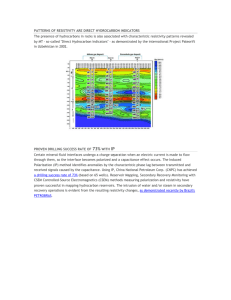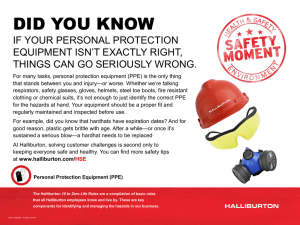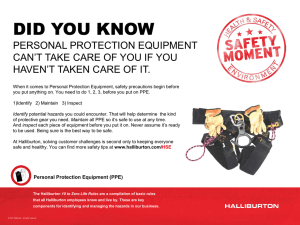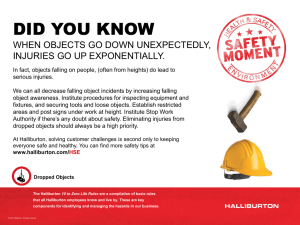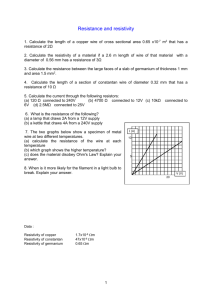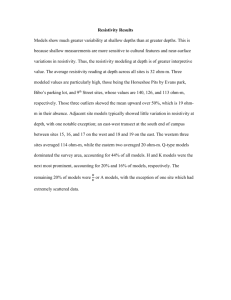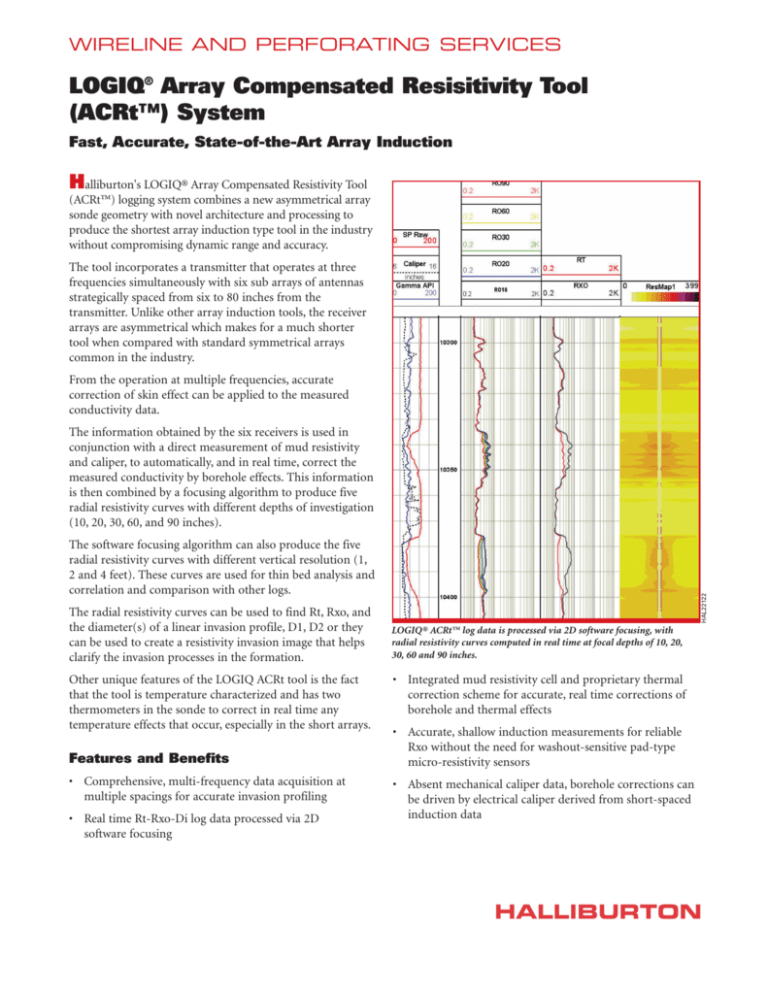
WIRELINE AND PERFORATING SERVICES
LOGIQ® Array Compensated Resisitivity Tool
(ACRt™) System
Fast, Accurate, State-of-the-Art Array Induction
H
alliburton's LOGIQ® Array Compensated Resistivity Tool
(ACRt™) logging system combines a new asymmetrical array
sonde geometry with novel architecture and processing to
produce the shortest array induction type tool in the industry
without compromising dynamic range and accuracy.
The tool incorporates a transmitter that operates at three
frequencies simultaneously with six sub arrays of antennas
strategically spaced from six to 80 inches from the
transmitter. Unlike other array induction tools, the receiver
arrays are asymmetrical which makes for a much shorter
tool when compared with standard symmetrical arrays
common in the industry.
From the operation at multiple frequencies, accurate
correction of skin effect can be applied to the measured
conductivity data.
The information obtained by the six receivers is used in
conjunction with a direct measurement of mud resistivity
and caliper, to automatically, and in real time, correct the
measured conductivity by borehole effects. This information
is then combined by a focusing algorithm to produce five
radial resistivity curves with different depths of investigation
(10, 20, 30, 60, and 90 inches).
The radial resistivity curves can be used to find Rt, Rxo, and
the diameter(s) of a linear invasion profile, D1, D2 or they
can be used to create a resistivity invasion image that helps
clarify the invasion processes in the formation.
Other unique features of the LOGIQ ACRt tool is the fact
that the tool is temperature characterized and has two
thermometers in the sonde to correct in real time any
temperature effects that occur, especially in the short arrays.
Features and Benefits
• Comprehensive, multi-frequency data acquisition at
multiple spacings for accurate invasion profiling
• Real time Rt-Rxo-Di log data processed via 2D
software focusing
HAL22122
The software focusing algorithm can also produce the five
radial resistivity curves with different vertical resolution (1,
2 and 4 feet). These curves are used for thin bed analysis and
correlation and comparison with other logs.
LOGIQ® ACRt™ log data is processed via 2D software focusing, with
radial resistivity curves computed in real time at focal depths of 10, 20,
30, 60 and 90 inches.
• Integrated mud resistivity cell and proprietary thermal
correction scheme for accurate, real time corrections of
borehole and thermal effects
• Accurate, shallow induction measurements for reliable
Rxo without the need for washout-sensitive pad-type
micro-resistivity sensors
• Absent mechanical caliper data, borehole corrections can
be driven by electrical caliper derived from short-spaced
induction data
HALLIBURTON
LOGIQ® ACRt™ System Specifications
3.625 in.
130.2
Instrument
Maximum Logging speed
6,000 ft/hr
1,830 m/hr
Operating Temperature Rating
350°F
177°C
Operating Pressure Rating
20,000 psi
1,400 bar
Minimum Borehole Diameter
4.75 in
121 mm
Maximum Borehole Diameter
12.25 in
311 mm
Length
19.5 ft
5.9 m
Weight
308 lbs
140 kg
Pre-Amp
Mud Cell
351.5
Measure
Point
221.3
154.4
HAL22123
111.1
J-Latch
Collar
Bottom of
J-Latch
3.8
www.halliburton.com/wireline
H05720 02/08
© 2008 Halliburton
All Rights Reserved
Printed in U.S.A.
Sales of Halliburton products and services will
be in accord solely with the terms and conditions
contained in the contract between Halliburton and
the customer that is applicable to the sale.
HALLIBURTON



